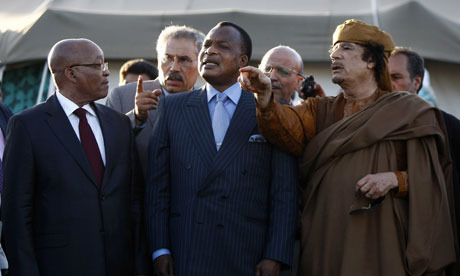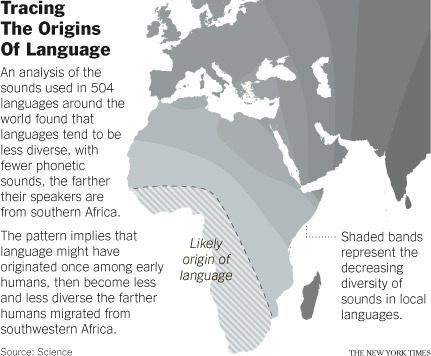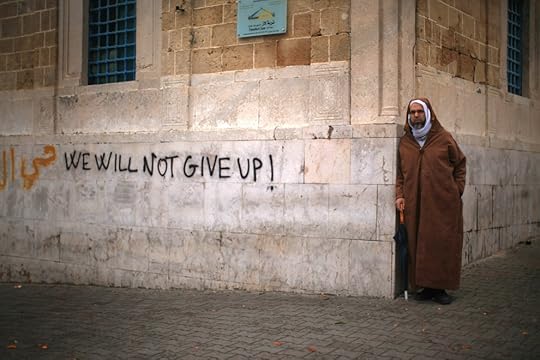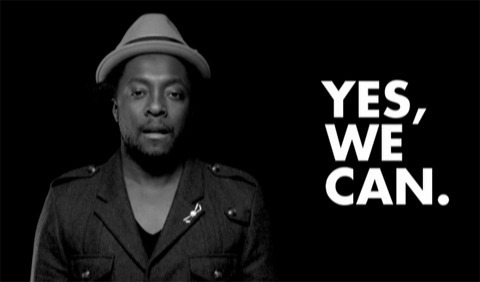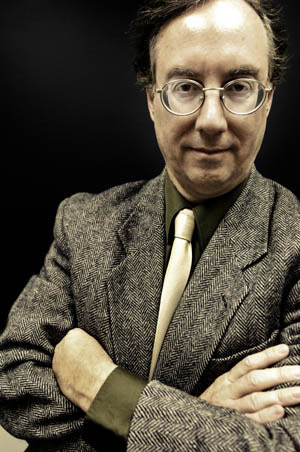Sean Jacobs's Blog, page 655
April 23, 2011
Strawberries and Peri-Peri
The website of South Africa's ruling party was down for a minute after hackers took it over. The site is back up again. But given that lately ANC leaders makes no distinction between political office and running businesses, I don't know what's the worry about:
The ANC has vowed to "unhack" its website after visitors were redirected to what seems to be a Turkish website which advertises food and shoes. On offer are products such as strawberries and peri-peri. ANC spokesperson and national executive committee member Jackson Mthembu said the hacking was in bad taste. "Those responsible for this do not want us to reach the electorate. This happened before. We are going to unhack it," he said. Mthembu said the ANC would attempt to "unhack" the site by this evening. At 6:30pm it was still reverting to another website.








So, language originated in Africa
"How do you feel being a young, black person in South Africa?"
The American President's Mother
Reporter Janny Scott in The New York Times, and the author of "A Singular Woman: The Untold Story of Barack Obama's Mother," writing about Stanley Ann Dunham:
The president's mother has served as any of a number of useful oversimplifications. In the capsule version of Obama's life story, she is the white mother from Kansas coupled alliteratively to the black father from Kenya. She is corn-fed, white-bread, whatever Kenya is not. In "Dreams From My Father," the memoir that helped power Obama's political ascent, she is the shy, small-town girl who falls head over heels for the brilliant, charismatic African who steals the show. In the next chapter, she is the naïve idealist, the innocent abroad. In Obama's presidential campaign, she was the struggling single mother, the food-stamp recipient, the victim of a health care system gone awry, pleading with her insurance company for coverage as her life slipped away. And in the fevered imaginings of supermarket tabloids and the Internet, she is the atheist, the Marxist, the flower child, the mother who abandoned her son or duped the newspapers of Hawaii into printing a birth announcement for her Kenyan-born baby, on the off chance that he might want to be president someday.








April 21, 2011
Why Now?
Perry Anderson in The New Left Review:
The odious cast of the regimes in place [in North Africa and the Middle East] has persisted unaltered for decades, without triggering mass revolts against them. The timing of the uprisings is not to be explained by their aims. Nor can it plausibly be attributed just to novel channels of communication: the reach of Al-Jazeera, the arrival of Facebook or Twitter have facilitated but could not have founded a new spirit of insurgency. The single spark that started the prairie fire suggests the answer. Everything began with the death in despair of a pauperized vegetable vendor, in a small provincial town in the hinterland of Tunisia. Beneath the commotion now shaking the Arab world have been volcanic social pressures: polarization of incomes, rising food prices, lack of dwellings, massive unemployment of educated—and uneducated—youth, amid a demographic pyramid without parallel in the world. In few other regions is the underlying crisis of society so acute, nor the lack of any credible model of development, capable of integrating new generations, so plain.








"When It Hits You, You Feel No Pain"
"When It Hits You, You Feel No Pain": A Conversation about Music and Politics
Wednesday, April 27 · 6:00pm – 8:00pm
Lang Cafe, The New School, 65 West 11th Street, NY, NY, 10003
65 West 11th Street
New York, NY
Music has power to move people's bodies, but does it have power to move their bodies into action? Music and politics are often intimate partners in society whether an artist consciously connects them or not. What role does music play in the politics of today's world?
What is the responsibility of artists as public figures to be politically conscious? Can the two stand on their own, or are they forever linked? We will explore some of these and other questions at this panel as part of GPIA's Media and Culture Concentration's
Conversations series.
With invited panelists Brian Jackson (musician/composer and Gil Scott Heron's main musical collaborator in the 1970s), Raquel Cepeda (journalist and director of "Bling, A Planet Rock"), DJ Laylo (DJ/filmmaker), Eddie 'Stats' Houghton (journalist, The Fader), Wills Glasspiegel (artist manager and radio producer) and Masauko Chipembere (musician, composer).
The panel will be moderated by Megan Bandle (South Africa House Initiative, Brooklyn).
Organized by Sean Jacobs and Boima Tucker.
Plus, Afterparty at Cayenne featuring Eddie Stats and Boima DJing
128 West Houston. Starting at 10pm
Celebrating Sierra Leone's 50th Independence Anniversary








April 20, 2011
'Nü Revolution'
Les Nubians have a new album (it's been on sale since yesterday). These are the videos for the singles "Afrodance" (above) and "Veuillez Veiller Sur Vos Reves" (below).
Information about their upcoming US tour starting this weekend in Philadelphia.








Academic Blogger
The New York Times is onto something. First, it was the Weapons of Mass Destruction. And now… its investigative reporters have found another hitherto elusive entity: The Academic Blogger: "A remarkable variety of scholars have achieved blogosphere fame, particularly those devoted to subjects related to the public sphere — politics, economics, legal affairs," declares reporter Pamela Paul, with the breathlessness ordinarily reserved for revealing a new species.
Looks like some academics have found that it's a desiccated world in the office space. The blogosphere allows them to be "deeply personal and, per the format's wont, downright snarky in ways they are not in the classroom," and offers them a space in which they can "regularly ruffle feathers" and even use the fanbase to troll for future spouses.
No surprises that all those featured are all white, mostly men (one woman: that's the story about future spouses, coming up) and mostly rightwing, including the one woman. One and a half of those featured could be described as left; more on that later.
For Ann Althouse, a rightwing law professor from the University of Wisconsin, Madison, her "offline and online worlds did intertwine, intimately and famously. After a flirtation with one of her commenters, a garden designer in Cincinnati, the two finally met face to face. They married in 2009."
Happily, there are other, more interesting featured academics. Most notably: Professor Juan Cole, history, University of Michigan, who describes himself as "Left of center, politically," and who began blogging in response to Sept. 11″ "As a Middle East expert who had lived for a long time in the Middle East, South Asia and Pakistan and who worked for years at a newspaper in Beirut, I had a lot of things to say and a lot of people had questions." After the US invasion in Iraq, his "public profile exploded."
–Neelika Jayawardane








Vanity Fair does Egypt
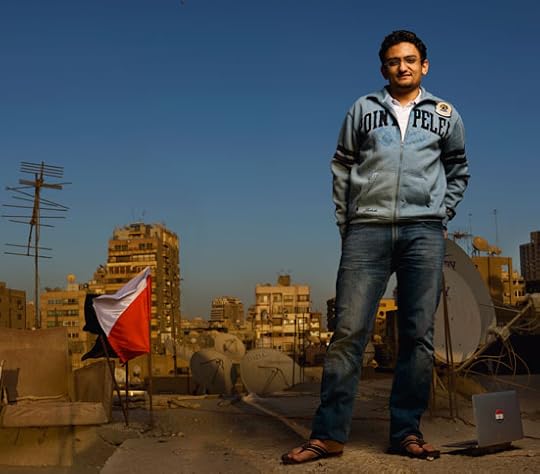
Vanity Fair's May issue features a photographic series of young Egyptians dubbed, at various points in the accompanying article, 'tech-savvy internet activists.' The first photograph is of Wael Ghonim, the Google executive who created the Arabic-language Facebook page, "We Are All Khaled Said." Ghonim (in the photo above) emerged as a hero of sorts (despite his public display of modesty), and to many around the globe represents the new face of this so-called 'Arab Spring.' Ghonim also participated in the referendum planning meetings with Egypt's High Military Council and other (all male) 'leaders' of the revolution, including the Muslim Brotherhood.
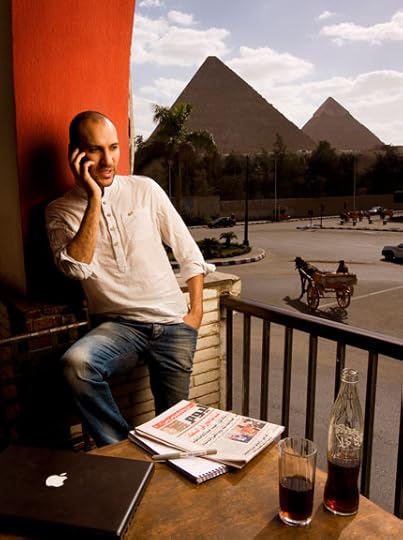
This is possibly something Mohamed Diab, one of those photographed (photo above), would have liked to discuss in more detail with Henry Porter, the author of the essay attached to the series. His film"678," which examines the daily sexual harassment the majority of Egyptian women face, is a harsh and necessary critique of the many issues Egypt and Egyptians must address. Certainly, Drs. Mohammad and El Sheikh as well as Ahdaf Soueif's nieces, also pictured (below), would appreciate their fellow revolutionaries joining in the fight against the harassment and oppression of women that persists at all levels of Egyptian society.

Considering this: where are the photographs of Egyptian women being verbally and physically attacked in Tahrir Square as they celebrated International Women's Day? Instead, we have a photo of King Tut's mask and it's armed personal guard. Another Egyptian king to protect by any means necessary, I suppose.
The referendum passed, despite failing to address the scope of presidential powers. This is also in spite of the majority of these 'young leaders' who campaigned against the referendum, hoping to receive time to institute more significant changes – changes that would prevent the military from arresting activists and bloggers, for instance (Egypt has a long, difficult history with military juntas). Instead, we are now contending with a significant disconnect between the media-praised 'tech-savvy' activists and their fellow citizens, most of whom will not be featured in a Vanity Fair article anytime soon.
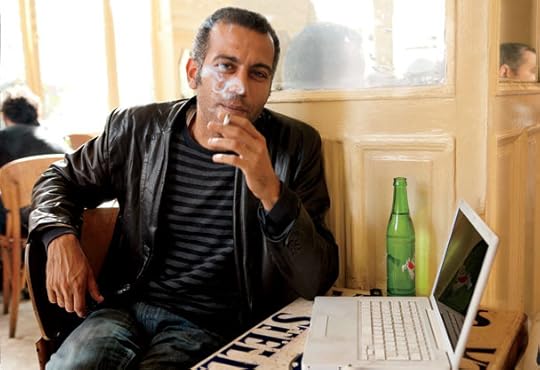
This photographic series does inspire some hope, however. As cynical as many Egyptians (namely myself) are, to see Egyptians such as these – politicians, celebrities, bloggers and journalists – out in the open, continuing to fight, is absolutely remarkable. Hossam el-Hamalawy (whose blog Arabawy has been a favorite of many activists for years, pictured above) sums up recent events in Egypt, and his own participation in them, quite simply: "Revolutions don't happen out of the blue."
See the full slideshow here.
–Sophia Azeb








Tim Hetherington
The photographer, Tim Hetherington, (b. in Liverpool) was killed in Libya. Another photographer Chris Hondros, who works for the New York Times, also died. The tragic news was first posted on Facebook by their colleague, Andre Liohm.
Hetherington, who started his career in West Africa (mainly in Liberia and Sierra Leone) was featured on this blog when photojournalist Glenna Gordon talked to us about her 5 favorite photographers. At the time she described him as an "ideas guy." (Another of those featured in Glenna's interview, Lynsey Adario, was briefly held hostage by pro-Gaddafi forces, before she was released last month).
The photo above is from Hetherington's series "Blindsided" about blind people in Sierra Leone. You can see Hetherington talk about his work here and here (as part of a larger panel). Below is a video, for Human Rights Watch, where Hetherington talks about Liberia and his work there:








Sean Jacobs's Blog
- Sean Jacobs's profile
- 4 followers


